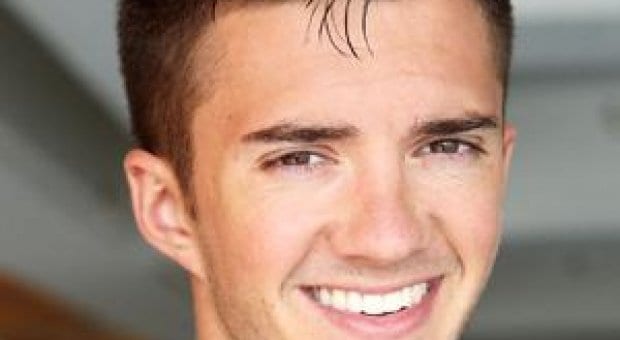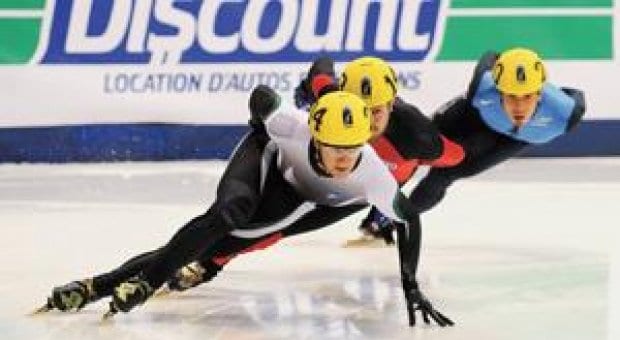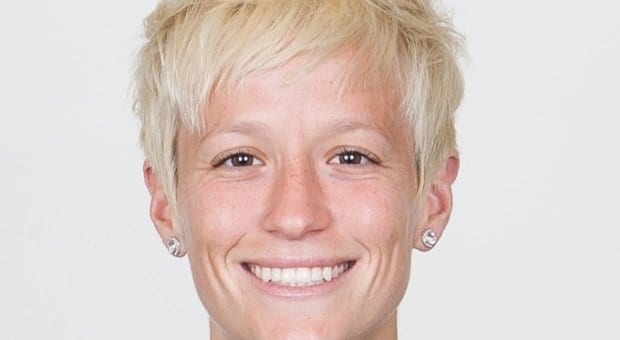
Blake Skjellerup, who came out publicly after placing 16th in short-track speed skating in the Vancouver 2010 Winter Olympics, wants to be a role model to other gay athletes. Credit: Double Barrel

Credit: Double Barrel
In the 33rd minute of the match, the ball streaks across the field in front of midfielder Megan Rapinoe.
The American women’s soccer team has pushed nearly to the box in front of the Colombian net. From the moment her right foot taps the ball, Rapinoe has less than two seconds before three Colombian players will surround her. It is enough.
She smartly taps the ball back to her left foot, in front of her right, and then sends it sailing between the heads of the Colombian defence. The ball hangs in the air a moment, then lurches left, sails over the flailing hand of Colombian goalie Sandra Sepulveda and drops into the back of the net.
The US women’s win against Colombia sent the team to the quarterfinals, where they continued to a gold medal victory against Japan. Rapinoe, a 27-year-old lesbian, stood on the podium and received one of no fewer than 14 medals won by openly gay and lesbian athletes in London.
“I came out for the Olympics, and this is the best I’ve ever played,” Rapinoe says. “I do want to help break down barriers
. . . We’re on the cusp of a major shift with the gay and lesbian community. And it’s cool to be on the forefront of that.”
Rapinoe, and others like her, make gay and lesbian athletes more visible every Olympic Games. But behind their heroics, a puzzling question remains. While sports organizations and straight teammates declare their acceptance, while groups such as You Can Play push for the elimination of homophobia, and while role models like Rapinoe prove that gay shoulders can proudly bear gold medals, the total number of openly queer Olympic athletes remains curiously small.
By even a conservative estimate of the general population, there should have been at least 150 openly gay and lesbian athletes at the Olympic Games in London and at least 40 in the much smaller Winter Olympics in Vancouver. According to British gay historian Tony Scupham-Bilton, there were 25 out athletes in London and only six in Vancouver in 2010. In both cases, that’s a little more than 0.2 percent of the total number of athletes.
That number has grown steadily in recent years — Beijing featured nine openly gay Olympians in 2008 and Sydney only five in 2000 — but it remains a tiny sliver of a population.
So where are the gay Olympians?
A host of queer sports teams, athletes and activists have come to a sobering conclusion: role models like Rapinoe may not be enough to crack the obstinate shortage of gay Olympic athletes.
Conventional wisdom maintains that sports have simply not yet reached a tipping point of gay players. Patrick Burke, the co-founder of You Can Play, says that once a few athletes come out, more will follow. In the National Hockey League (NHL), where Burke is a talent scout for the Philadelphia Flyers, there are not yet any openly gay hockey players.
“We’re waiting for the first one,” Burke says.
According to Burke, all the necessary factors are in place for an NHL hockey player, or any other player in a major male sports league, to come out. Players, coaches, fans and media are all ready and welcoming. Once the first athlete comes out, he says, more will follow, and a trickle will become a flood.
“There is no remaining reason why athletes are not coming out,” he says. “I’m not passing judgment on the athletes who don’t come out. I think it’s up to them to plan how and when they do it, but there’s no reason why not.”
Blake Skjellerup, who came out publicly as gay just after placing 16th in short-track speed skating in Vancouver, says he came out because he wanted to be a role model.
“The biggest motivation for me was what I went through personally when I was young, not having any gay role models out there to relate to,” he says. “I felt extremely alone and like the only person who was gay and was in sport. It was very, very lonely.”
He hopes that other gay athletes will follow his lead and demonstrate that athletes can be gay. “It’s just going to take more people to be brave and come out,” he says.
But the lack of role models does not tell the whole story. While there are no role models in the big four professional male sports leagues, there are now enough examples of openly gay athletes in the Olympics, such as Skjellerup and Rapinoe. And yet, the rise in out athletes has remained gradual. If there is an Olympic tipping point, it has yet to be reached.
“There’s probably too much focus on a gay Jackie Robinson who’s going to transform all of sports,” says Marc Naimark, vice-president of the Federation of Gay Games. “We put a lot of responsibility on athletes. I think they’re in a special situation where they need support.”
Naimark thinks that instead of focusing on current athletes, gay groups should ensure that the next generation of athletes is more gay-friendly.
“In professional sports, I wouldn’t count so much on somebody coming out,” he says. “There will be out gay athletes in those sports because there will be out gay college athletes, because there are out gay high school athletes.”
Lou Englefield, the head of Pride House at the 2012 Olympics in London, agrees that change needs to focus on the environment in which athletes develop.
“A lot of elite athletes have been in their sport since they were children,” she says. “And you get athletes who from the ages of eight, nine or 10 are training three or four times a week in their sports club. And sports are still incredibly homophobic . . . So expecting a whole lot of people to be out in an environment that they’ve been in almost all of their lives, that has been a really significant part of their growing up and formulating who they are, and then expecting those people to be out is a bit unrealistic.”
Cyd Zeigler, a co-founder of gay sports website Outsports, says that athletes also have too much on their minds to think about coming out.
“You’re dealing with very young people who spend every waking hour focused on one thing, and that is getting better at their sport,” he says. “They are so consumed with their sport that, not only coming out, but having a boyfriend just isn’t realistic.”
Skjellerup says he looks forward to being out and proud at the Olympics at Sochi, but most of his energy will go into speed skating. Historian Scupham-Bilton points out that many gay athletes don’t come out until their 30s, or after retirement, when the pressure to perform and win endorsements is behind them.
Finally, many Olympians face challenges from their home countries. London’s 25 openly gay Olympians came from only 10 nations. “A lot of the athletes come from very homophobic countries,” Ziegler says. “To be openly gay in Russia or Saudi Arabia or Iran or Honduras is not a good thing.”
All the pressures athletes face, Naimark says, are exactly why sports organizations have to take the lead in promoting gay equality. A good example is the London Games, where the organizing committee hired queer staff and volunteers and supported Pride House.
“When they set out, they said, ‘We are going to make diversity and inclusion a key differentiator of these Games,’” Englefield says. She credits that effort with making the London Games so gay-friendly.
But a shadow hangs over the next Olympic Games, to be held in Sochi, Russia, in 2014. A Russian judge has banned a Pride House from Sochi, and organizers such as Englefield and Naimark worry for the security of openly gay people attending the Games. Some local laws in Russia ban speech that promotes homosexuality.
Naimark blames the International Olympic Committee, which he says has not stood up for gay rights. He says gay sports groups have lobbied the IOC to put pressure on Russia but to no avail. “I’m not very hopeful,” he says. “But the only way to get that action is to keep pointing to [the IOC’s] failings.”
Asked for comment, the IOC would respond only with a written statement: “The Olympic Charter does not allow for discrimination against those taking part in the Olympic Games. The IOC is an open organisation and athletes of all orientations will be welcome at the Games.”
Konstantin Yablotskiy, head of the Russian LGBT Sport Federation, doesn’t think gay athletes or fans have anything to worry about in Sochi. The best plan, he says, is to avoid conflict and quietly prove that gay athletes have a place in the Olympics. He has been running gay sporting events in Russia for years without incident.
“We are trying to make a dialogue but not a clash,” he says. “We are trying to higher the position of all the LGBT community by positive tools . . . This is our way.”
Yablotskiy would like to see national pavilions in Sochi host gay receptions, sidestepping the ban on a Pride House. Small steps like these, many of the organizers agree, will slowly make sports better for gay athletes.
“For so long, the only voices you heard in sports were anti-gay,” Zeigler says. “There are so many organizations and companies now that are putting forward the positive voices. I think for every voice you hear, another brick gets taken off the wall. Of course, people say things that add a few bricks, and then we take a few back. But slowly, we’re taking down the wall.”
“I think people who come out do feel good about it,” Rapinoe says. “It’s a weight off their shoulders. And then people can say, ‘All right, let’s get back to why we’re really talking to them, which is because they’re one of the best divers or soccer players in the world.”


 Why you can trust Xtra
Why you can trust Xtra


